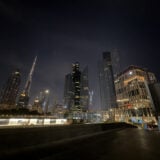The Syrian property investment market received a substantial push when Qatar’s state own Diar firm and Emaar Properties based in the UAE both announced large development plans totalling nearly $450 ($1.6 billion-dirhams). This is a welcome vote of confidence by foreign investors into the Syrian market since many firms based in the Gulf have been unable to start their own mega-projects for nearly three years. Events such as the recent strike on Syria that took place last year and the invasion of southern Lebanon by Israel in 2006 have left a feeling of political uncertainty regarding the region.
The state-owned Diar released plans to develop a resort on the Syrian coast worth approximately $350 million. Ghanem Bin Saed, chairman of Diar did not indicate a specific start date for the development which will cover a beachfront plot roughly 244,000 square meters. He did tell reporters that the construction timeline was three years to completion. There has been a tender issed by Diar to build a marine works near the city of Latakia.
Emaar Properties, also based in the UAE, signed on a venture with Cham Holding worth $100 million. Syran tycoon Rami Makhlouf controls Cham Holding. Earlier in 2006, Emaar nearly began a development worth $500 million, but construction never commenced for the residential complex located near Damascus. Although Emaar did award a contract for part of the construction to UAE firm Arabtec earlier this year in January, it is still unknown what Emaar intends for this residential complex to surrounding neighbourhoods where there was rampant illegal housing.
Although the Syrian government has made some strides as far as relaxing very strict laws regarding private investment, investors continue to struggle meeting the regulations and relatively many hurdles created from the bureaucracy within the Syrian government.
However, many investors continue to work towards developing projects within Syria. Al Saad, the Qatari Diar CEO expressed reasons why they continue working through the bureaucratic hurdles, “We have been trying to invest in European countries where the response is not so encouraging as it has been here.”





